A day or so ago, one of my oldest friends—we’ll call him Jackson, since he has a mania for anonymity that transcends my understanding—asked me to come up with a list of movies that his daughter (14 going on 15) should see. Now, I’m the last person on earth I’d ask such a thing. (Let’s face it, I’m the guy who had a four-year-old daughter who could sing “Sweet Transvestite” from The Rocky Horror Picture Show.) But then I’ve never rated Jackson’s judgment all that high. After all, he’s been friends with me for 38 years. That tells you something.
In what I can only call typical Jackson fashion, he gave me such vague information as “Charlotte can handle black and white, and she can handle old. She’s not too good with boring, though.” Jackson’s always been helpful like that. A flurry of e-mail exchanges followed, which allowed me to get a somewhat clearer picture of what she had and hadn’t seen and how she’d responded. Even so, this consisted of things like, “As far as I know, she is zilch on Marx Brothers, Fields, West, and Chaplin,” and “Has seen Barkleys of Broadway (1948) and part of either Top Hat (1935) or Swing Time (1936).” I also learned that she seems to find Johnny Deep “creepy,” liked Rocky Horror when she was younger, has seen O Brother, Where Art Thou? (2000) and Fargo (1996), and that she “seemed a bit disturbed by Across the Universe (2007).”
Yes, it would have helped to learn why she found Across the Universe disturbing. Or maybe not. She may truly be her father’s child, and her father is responsible for a piece of movie criticism that has baflled me for a good 30 years—the complaint that Ken Russell’s The Music Lovers (1970) has “too many busts in the backgrounds.” I won’t say I find the criticism un-entertaining, but I also don’t see that it offers much room for discussion. It is, however, unique, I suspect.
Now, I do suspect that the idea of indirect advice is wise. The daughter is at the perfect age to be resistant to parental input (at least I hope she is) and may be more likely to consider the advice of a perfect—or even imperfect—stranger. Almost everyone knew more than my parents when I was that age, which is perhaps only fair, since my mother still seems to believe that I know less than just about anyone (except as concerns political affliations).
Anyway, I’m kind of saddled with this task and have opted to come up with some titles that seem to me might fit the bill—and, of course, I’m hoping that readers toss some suggestions my way before it’s over.
Let’s start with the established gaps of Chaplin, the Marxes, W.C. Fields and Mae West. The question of what I’d suggest in general for anyone wanting to explore these folks’ work is complicated by trying to factor in the likelihood of the appeal to a nearly 15-year-old girl. Having never been a 15-year-old girl, that’s on the tricky side to say the least. Even though I was once 15, that’s not much help, because I was well into these things at 15. Still, I’ll give it a shot.
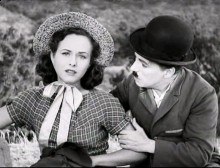
Working chronologically, we first hit Chaplin, though that crosses a daunting span from 1914 to 1957. I’d eschew the antiquity and the more modern (relatively speaking) titles. The early films—however clever they might be—seem to take place in an alternate universe that can be hard to relate to, and the later films don’t present Chaplin in his most recognizable form. Left to my own choice, I’d probably call City Lights (1931) his best film—and it would be useful to cross-reference with Woody Allen’s Manhattan (1979), since Allen’s film offers a variant on Chaplin’s ending shot. But—and this is dependent on the young lady’s minset—I have a tendency to think that the social commentary, the cocaine gag and the slicker production values of Modern Times (1936) might be a better bet, since it’s edgier. At least, I’d consider it on that basis.
If one Chaplin film proves successful and there’s a desire to look at his range, I’d go for one of his talkies. The edgiest title is certainly Monsieur Verdoux (1947) with its serial-killer hero. The most sentimental is Limelight (1952). The most political is A King in New York (1957). Again, we’re in the realm of the—to me—unknown personality involved. All are excellent films and A King in New York is a good starting point for learning about HUAC and the McCarthy witch-hunts of that era.
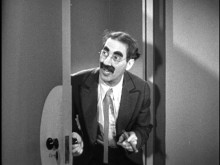
A similar quandary exists with the Marx Brothers. Here the question becomes the taste for the anarchic vs. the taste for a “well-crafted” storyline. If you want to just go ahead and take the plunge into full-blown Marxism, then the best of the lot is Duck Soup (1933), though it does have one aberrant aspect that makes it perhaps not the best choice for meeting the boys. It lacks both a harp solo from Harpo (which suits me fine) and a piano solo from Chico (which suits me less well). With that in mind, I might suggest going with Horse Feathers (1932). The football game ending is a little weak, but the movie overall has everything that defines the Brothers. All this presupposes a taste for the anarchic. There’s a chance that the more conventionally plotted A Night at the Opera (1935) would go down better. A Day at the Races (1937) has its merits, too, but I wouldn’t hit anybody of any age with anything later than that for a first outing or they might not go back.
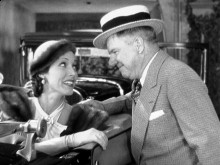
W.C. Fields presents the dilemma of being a comedian who in broad terms is traditionally not liked by women. He also falls into specific periods. His early sound features and his last four starring films present Fields as a character not only devoid of sympathy, but one who would refuse it if it was offered. There’s a more lovable Fields at the heart of such mid-1930s films as You’re Telling Me (1934), It’s a Gift (1934), The Man on the Flying Trapeze (1935) and Poppy (1936). In that regard, I think I’d suggest You’re Telling Me, but that may be because I’ve seen It’s a Gift too many times. And it should be mentioned that The Man on the Flying Trapeze (1935) wouldn’t be a bad choice.
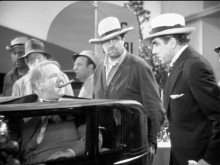
However, I’m going to make a bold suggestion and say that International House (1933) is the way to go. OK, it’s the more acerbic Fields and he doesn’t come in till the movie’s at least a third over, but you also get George Burns and Gracie Allen, Cab Calloway singing “Reefer Man,” Baby Rose Marie (who would grow into Rose Marie of Dick Van Dyke Show fame) singing “My Bluebird Is Singing the Blues,” Bela Lugosi and lots of risque pre-code dialogue and even more risque pre-code costumes on the chorus girls. That’s a whole lot of cultural touchstones crammed into one 70 minute movie. I think a friend of mine put it best when reviewing this movie years ago—“You need own no other movie!”
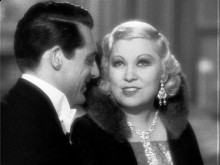
Mae West is easier. She Done Him Wrong (1933) is probably her most iconic movie and Leo McCarey’s Belle of the Nineties (1934) is certainly her most stylish (simply because it is Leo McCarey’s). But I think I’m No Angel (1933) is her most immediately appealing to the uninitiated. It’s also the raunchiest—in relative terms. Plus, not only does Mae actually say, “Come up and see me sometime,” she sings it, and she adds the immortal “Beulah, peel me a grape” to her repertoire. There’s also the bonus of Gregory Ratoff in the supporting cast. Plus, there’s something appealing about the way that in this one film we actually see Mae rise from grubby beginnings—where she sings “They Call Me Sister Honky Tonk” to a crowd she openly calls, “Suckers”—to a more glamourous position in life.
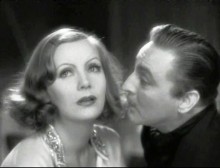
Branching out from classic comedy, I think I’d apply the same logic to drama that I did to comedy where International House is concerned and head straight for Edmund Goulding’s Grand Hotel (1932). It’s a good movie in its own right, but its greatest value here lies in its position as a kind of Whitman’s Sampler of movie stars of the era. In one fell swoop, you get introduced to John Barrymore, Lionel Barrymore, Wallace Beery, Joan Crawford, Greta Garbo, Lewis Stone and Jean Hersholt. (There are some bonus character actors, too, like Ferdinand Gottschalk, Raffaelo Ottiana, Tully Marshall, and the always welcome Edwin Maxwell.) Nearly all the stars—except perhaps Crawford—did better work, but my guess is that if you don’t like them here, you’re probably not going to like them elsewhere. That may not be true of Wallace Beery who is uncharacteristically cast in a completely unsympathetic—downright repellent—role.
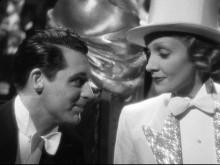
Other strong candidates for drama—bearing in mind that it’s necessary to draw from movies that are readily available on DVD—might be Josef von Sternberg’s Blonde Venus (1932), which is part of a so-called “Glamour Collection” of Marlene Dietrich titles. This is by no means the best of the Sternberg-Dietrich movies, but the best—Shanghai Express (1932)—is not available on DVD at least on Region 1. (It’s truly appalling that so many American classics are readily available in the UK and Europe, but not here.) Blonde Venus, however, is an amazing looking film and something of an essential outburst of uber-stylish kitsch. We’re talking about a movie in which Dietrich comes out onstage in a gorilla suit, strips down to her real self, dons a blonde afro wig and sings “Hot Voodoo.” Later on she appears in all-white white-tie-tails-and-top-hat and sings “I Couldn’t Be Annoyed.” There’s nothing like it—and it’s good preparation for seeing Bernardo Bertolucci’s The Dreamers (2003), which I wouldn’t recommend for a 15-year-old—unless we’re talking about a singularly mature 15-year-old.
John M. Stahl’s Imitation of Life (1934) is also a really solid choice for someone just dipping into movies of this era. It has the benefit of being a well-crafted drama with strong performances from Claudette Colbert, Louise Beavers, Warren William and Fredi Washington—not to mention a winning comedy turn from Ned Sparks. It’s also a film with a social conscience on the topic of racism that is of its time, ahead of its time and still relevant today. It’s a movie that my daughter knew from an early age—and she happened to be at the recent Asheville Film Society screening where, even at the age of 33, she ended up having to wipe her eyes.
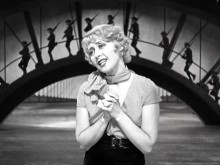
While I’d personally introduce a young person to Rouben Mamoulian’s Love Me Tonight (1932), which gets my vote as one of the truly great musicals—and just plain great movies—of all time, I think it might be best left for later. Instead, I’d start with the Mervyn LeRoy-Busby Berkeley (LeRoy did the straight scenes, Berkeley the musical numbers) film Golddiggers of 1933 (1933). This is arguably the best of the Berkeley musicals—certainly its ending is the most daring (and while I won’t say any more about it, it’s not surprising that nothing like it was ever done again). It’s also fast and funny—in that special way that only pre-code movies can be. It’s also a good springboard to Berkeley’s almost psychedelic The Gang’s All Here (1943) with Carmen Miranda in Technicolored glory.

I’m a little alarmed that Jackson’s daughter has only seen The Barkleys of Broadway, easily the least agreeable of all Fred Astaire-Ginger Rogers pictures, and I’m equally concerned that she’s only seen “part” of Mark Sandrich’s Top Hat and George Stevens’ Swing Time. I don’t, however, know why the latter is true. If it’s because she didn’t care for them, I’d probably give up Fred and Ginger—at least for now—or try a smaller, cruder dose with their first movie Flying Down to Rio (1933). It’s possible that its sheer outrageousness will impress in a way that the gentler charms of the others didn’t.
Being who I am (having written a book on the topic), it would be remiss of me to not suggest at least one Charlie Chan movie, especially now that all the Fox Chans that are known to exist (four are still missing) are out on DVD. I suppose I might suggest Hamilton MacFadden’s The Black Camel (1931) or Gordon Wiles’ Charlie Chan’s Secret (1936), if only because producer John Cork and I did audio commentarries on those, and she could listen to me pontificate about the movies (which is more than I’ve ever done with the discs).
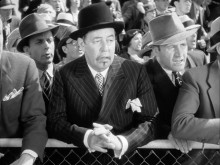
Those, however, are not my first choice as an introduction. I’d go for H. Bruce Humberstone’s Charlie Chan at the Race Track (1936), which has always seemed to be the film that most completely embodies what we mean by a “Charlie Chan picture.” And should she undertake it, dad can tell her to watch closely for the scene where Charlie (Warner Oland) notices something awry during a race. Why? Well, Keye Luke (who plays Charlie’s “No. 1 son,” Lee) once told me that Oland—a notoriously heavy drinker—was pretty well gone when they shot that scene. So Humberstone had everybody crowd in behind Oland to prop him up and then fired a gun nearby to startle him into that expression.
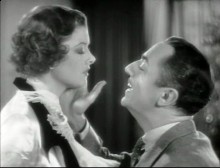
If you’re going to do mysteries, though, it’s essential that you also try W.S. Van Dyke’s The Thin Man (1934) and John Huston’s The Maltese Falcon (1941). There’s probably no need for me to suggest the former to Jackson, but the latter is one of those movies—like Michael Curtiz’s Casablanca (1942)—that you don’t have to like, but that you need to see regardless. You also need a Sherlock Holmes movie—and from a movie standpoint that means one with Basil Rathbone and Nigel Bruce. The best is probably Alfred Werker’s Adventures of Sherlock Holmes (1939), but there’s something to be said for the updated (occasionally Holmes vs. the Nazis outings) films made at Universal. In that case, Roy William Neill’s Sherlock Holmes and the Secret Weapon (1942) is probably the cleverest blend of traditional and modern. But beware—this one fell into the public domain and there are some lousy copies out there, so try to get the one in the sets put out by MPI.
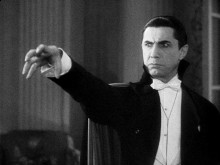
Presumably, he’ll want her to have some kind of frame of reference on the horror film, especially since Jackson’s own tastes include that genre. You can’t really do this without the basics like Tod Browning’s Dracula (1931), James Whale’s Frankenstein (1931), Karl Freund’s The Mummy (1932) and Whale’s The Invisible Man (1933), though those may not have the most obvious appeal in that all of them but The Invisible Man might seem a little slow to a 15-year-old in 2010. But I’m not sure you can get around them. I’d also add Whale’s Bride of Frankenstein (1935), Michael Curtiz’s Doctor X (1932) and one of the Karloff-Lugosi titles—either Edgar G. Ulmer’s The Black Cat (1934) or Lew Landers’ The Raven (1935). (Since Jackson has a good grounding in classical music, The Black Cat would offer the chance to go into another area of art in discussion.)
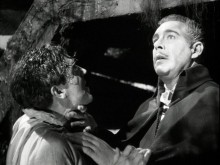
And that’s the very tip of the horror iceberg. GeorgeWaggner’s The Wolf Man (1941) isn’t a very good movie, but it’s not only an essential, it definitely has an appeal to those who are at “that awkward age,” though I’m unsure how it would resonate with a young woman. Robert Siodmak’s Son of Dracula (1943) is a terrific—and surprisingly grim—movie with a lousy Count Dracula (Lon Chaney, Jr.) working against it. None of this figures in Karloff’s “Mad Doctor” series at Columbia, and if you want to bring that in Edward Dmytryk’s The Devil Commands (1941) is probably the way to go. But what about poverty row? That’s an area near to Jackson’s heart, but movies like The Devil Bat (1940), King of the Zombies (1941) and The Black Raven (1943) require acquiring a certain mindset for the absurd.
The problem with this whole idea is that here we are about 2700 words into the thing and we’ve barely scratched the surface. I’ve only slightly—and mostly fleetingly—gotten out of the 1930s, and I haven’t gone backwards into the silent era. I’m always amused by Josef von Sternberg’s claim that he was going to take up Chinese philately when he retired because he wanted a hobby he couldn’t exhaust. He must not have realized that he already worked in a realm that could not be exhausted (or he merely didn’t think much of movies he hadn’t made). There’s such an abundance of movies to choose from that it’s overwhelming.
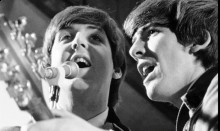
As noted about The Maltese Falcon and Casablanca, there are some things that simply need to be seen for purposes of cinematic literacy. I might personally prefer to skip over Gone with the Wind (1939), but it’s impossible to ignore the damn thing. How do you approach cinematic literacy without including Orson Welles’ Citizen Kane (1941), William Wyler’s The Best Years of Our Lives (1946), Jean Cocteau’s Beauty and the Beast (1946), Carol Reed’s The Third Man (1949), Charles Laughton’s Night of the Hunter (1955), Ingmar Bergman’s The Seventh Seal (1957), Jean-Luc Godard’s Breathless (1960), David Lean’s Lawrence of Arabia (1962), Federico Fellini’s 8 1/2 (1963), and Richard Lester’s A Hard Day’s Night (1964)? You really can’t.
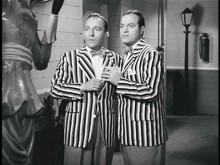
I notice I side-stepped Ernst Lubitsch, so I’ll throw out One Hour with You (1932) or Design for Living (1933) on his behalf. I kind of gave Rouben Mamoulian a glancing blow by not quite suggesting Love Me Tonight (1932), so I’ll toss that—along with his Dr. Jekyll and Mr. Hyde (1932)—into consideration. Preston Sturges got overlooked, too. For pure laughs, I’d say The Palm Beach Story (1942). If you want something deeper, it’s Sullivan’s Travels (1941). Bing and Bob in the various “Road” pictures aren’t in here, and since I fully believe they ought to be and that Charlotte needs to know the source of her father’s Jackson sobriquet, I’m suggesting Road to Rio (1947).
And what about Howard Hawks and John Ford—not to mention such often overlooked directors as John Cromwell, William Dieterle, Harry D’Abaddie D’Arrast, Frank Tuttle, Mitchell Leisen, George Cukor and Stanley Donen? To this end, I offer the following (in order of the list of directors): His Girl Friday (1940), Donovan’s Reef (1963), Since You Went Away (1944), Portrait of Jennie (1948), Topaze (1933), Waikiki Wedding (1937), Death Takes a Holiday (1934), Holiday (1938) and Funny Face (1957).
This only gets to what I’d loosely call modern film, which for me starts with A Hard Day’s Night. Even that could be broken down into sub-headings and raises the question of whether or not we’re still in the modern era, or if we’ve crossed over into some kind of post-modern era. I think a case could be made for both ideas. But that’s another discussion for another time. So are the films of the post-1964 era—at least for now.
I do think I’ve come up with a pretty fair, pretty solid, pretty lengthy list of suggestions, but, as usual, I’ll be more than happy to entertain suggestions from readers of movies that I’ve missed. I’ve already realized a few things that are likely to be considered essential that got past me. Let’s see who else spots them. A couple of them are what we call doozies down home.




How about the original Scarface? That is one of the first old movies I saw, along with The Roaring Twenties. I don’t know how much a girl would like that stuff however.
The Dreamers (2003), which I wouldn’t recommend for a 15-year-old—unless we’re talking about a singularly mature 15-year-old.
I saw it at 16, so maybe she should wait a year.
I love this article and it’s extremely interesting to me, reading through and realising how many of these films I had seen when I was fifteen. I don’t think I’d seen Shanghai Express, The Devil’s Commands, Imitation of Life or any Charlie Chan films, but I’d watched the other titles mentioned here.
I’d take issue with your Holmes pick through – I think THE PEARL OF DEATH has dated a lot better than THE SECRET WEAPON, although that may not be an advantage if you’re watching the film partly to get a flavour of the era. But if you want cinematic Holmes, why not THE PRIVATE LIFE OF SHERLOCK HOLMES?
How about the original Scarface?
I actually considered that when throwing in a Hawks picture, though it’s not much like “mature” Hawks, which is partly why I opted for His Girl Friday.
I don’t know how much a girl would like that stuff however
I think it would depend entirely on the girl.
I saw it at 16, so maybe she should wait a year.
I think you might be something of an anomaly. In any case, I’m leaving this one in the land of “Jackson needs to see it and make his own decision.” I think it’s a wonderful look at movie geeks of its age (some of it plays like my own life), but…well, you’ve seen it.
I love this article and it’s extremely interesting to me, reading through and realising how many of these films I had seen when I was fifteen. I don’t think I’d seen Shanghai Express, The Devil’s Commands, Imitation of Life or any Charlie Chan films, but I’d watched the other titles mentioned here.
I’d seen all the horror titles, all the Charlie Chans except the then-missing Black Camel, the Road pictures, Imitation of Life, His Girl Friday, Donovan’s Reef, A Hard Day’s Night, Holiday, Sullivan’s Travels and some of the Marx Bros. and Fields. Of course, 1954-1969 was a very different time. It was a time when you waited and hoped to catch movies pretty much on the late show on a handful of channels — and it was all dependent on which studio package the station had leased.
I’d take issue with your Holmes pick through – I think THE PEARL OF DEATH has dated a lot better than THE SECRET WEAPON, although that may not be an advantage if you’re watching the film partly to get a flavour of the era.
I’m not that fond of Pearl of Death, but I was making the choice more on a pop culture basis with a film that places Holmes and Moriarty in a contemporary setting. As a film, I’d probably go with The Scarlet Claw or maybe even The Spider Woman.
But if you want cinematic Holmes, why not THE PRIVATE LIFE OF SHERLOCK HOLMES?
If I wanted cinematic, I’d have gone with Wm. K. Howard’s Sherlock Holmes (1932), but try to find it — even now. Also, I wanted a Rathbone film. And I ended at 1964. But I might also note that Private Life is a movie that loses me as soon as it gets to the Loch Ness Monster part. It’s ultimately something I want to like far more than I actually do.
As a film, I’d probably go with The Scarlet Claw or maybe even The Spider Woman.
Actually, scratch PEARL OF DEATH and replace it with SPIDER WOMAN. That’s my pick.
Actually, scratch PEARL OF DEATH and replace it with SPIDER WOMAN. That’s my pick.
Gale Sondergaard fan?
Hmmm. Never thought about this one, that’s for sure. Since modern teens seem to think that junk like “Transformers” and “Armageddon” are SciFi I’d have them check out some gems from the SciFi heyday.
Howard Hawk’s “The Thing”. Heavily copied.
“Forbidden Planet”. Ditto.
Robert Wise’s “The Day The Earth Stood Still”
“It Came From Outer Space”.
“Gojira”. (You knew THAT one had to be on the list.)
“Enemy From Space (QuatermassII”). Probably more accessible than I or III.
My idea is to show them that scifi can be effective by NOT showing things and how important atmosphere is and frankly how unimportant special effects can be.
Also Fritz Lang’s “Metropolis”. I’d call it an essential. I remember really wanting to see it when I was a kid but that was 20 years before VCRs and cable TV. Finally saw it in 1984 and recently bought the fully restored version.
Fritz’s “M” too.
Really I would think that Duck Soup would be a fine Marx Brothers introduction. Monkey Business might also be a good choice. I’ve always found A Day At The Races to be inferior to A Night At The Opera though.
For Chaplin I would think a better choice would be found amongst his short films. The Immigrant or The Cure would be my choices… perhaps followed by One AM. These are available on dvd in The Chaplin Mutuals collection (The most recent edition has the most complete print of One AM that has been available in decades.)
For Lubitsch I might add Trouble In Paradise. It was risque for the 30s and did not have a re-release for 30 years after the production code came in but is quite tame by even today’s family sit-com standards.
I would think if you wanted to recommend a silent drama then F.W. Murnau’s Sunrise would be an excellent place to start.
“Gojira”. (You knew THAT one had to be on the list.)
Actually, I’d put it on the list sooner than some of your other titles (I simply do not understand why people like Forbidden Planet or It Came from Outer Space). I think I like the idea of Quatermass 2 (a milestone in being not only the first numbered sequel, but for using an Arabic numeral), but it’s a film I really need to see again. I wonder if I have it…
Also Fritz Lang’s “Metropolis”. I’d call it an essential. I remember really wanting to see it when I was a kid but that was 20 years before VCRs and cable TV. Finally saw it in 1984 and recently bought the fully restored version.
But remember, I opted not to deal with silents as such.
When you say “fully restored,” you don’t mean the one with 30-ish more minutes of footage, do you? I didn’t think that had left theatrical play yet.
I’ve always found A Day At The Races to be inferior to A Night At The Opera though.
In the main, I’d agree. Personally, I find all the MGM films to be inferior to the Paramounts, but I still think Races is good — and it has the bonus of Ivie Anderson and the “All God’s Children Got Rhythm” number. It’s also blockier than Opera, true, and Maureen O’Sullivan annoys me, especially up against Kitty Carlisle. Plus, the water ballet is a bore. But I don’t think it’d be a bad introduction for a 15-year-old.
For Chaplin I would think a better choice would be found amongst his short films.
Here, we definitely part company. I vastly prefer Chaplin from the First National period forward. I like the Mutuals — and some of the Essanays — but I don’t think I’d introduce anyone to Chaplin with them. But that’s just me. If you could make a case for why they’d be a better choice, though, I’d listen to it.
For Lubitsch I might add Trouble In Paradise. It was risque for the 30s and did not have a re-release for 30 years after the production code came in but is quite tame by even today’s family sit-com standards.
Actually, I think it’s Lubitsch’s masterpiece, but from a sophistication standpoint (not a censorial one), I think the more obvious comedy of One Hour with You or Design for Living might play better to a 15-year-old. I just wish the Lubitsch Musicals set had used the print that was used for the laserdisc set.
I would think if you wanted to recommend a silent drama then F.W. Murnau’s Sunrise would be an excellent place to start
I’d agree with that — except that there’s kinda no place to go after it. I mean, you’re not going to find something better. Borzage’s 7th Heaven comes closest for me. But again, I was staying away from silents here — Chaplin being the exception.
When you say “fully restored,” you don’t mean the one with 30-ish more minutes of footage, do you? I didn’t think that had left theatrical play yet.
Oops, I have is the 2002 release that’s 124 minutes long. It’s hard to keep track of “Metropolis” restorations without a scorecard.
I simply do not understand why people like Forbidden Planet or It Came from Outer Space.
Well, you’ve said you don’t generally care for scifi but people who do seem to like those movies. Regardless, I think they are pretty influential. I’m trying to think of examples of scifi that can be effective without a lot of special effects, thus “It Came From Outer Space”.
Perhaps a Harryhausen adventure like “Earth vs The Flying Saucers”, “Jason and The Argonauts” or “Seventh Voyage of Sinbad” would be an entertaining recommendation for teenagers also. The special effects in those seemed to be driven by the story rather than the story being driven by effects.
My personal opinion is that the ease of digital effects has been as much of a detriment to the genre as an aid. They are a wonderful tool but without a compelling story an effects laden movie is boring IMHO.
Oops, I have is the 2002 release that’s 124 minutes long. It’s hard to keep track of “Metropolis” restorations without a scorecard.
That’s exactly why I asked. These things shift all the time and I was curious if the new and nearly complete version was out before I had heard. Since I’m debating about booking a special screening of it for the AFS, my curiosity was of even greater moment.
Well, you’ve said you don’t generally care for scifi but people who do seem to like those movies. Regardless, I think they are pretty influential.
True on all points. Though It Came from Outer Space bores me personally — give me The Man from Planet X or Invaders from Mars from that era — I wouldn’t so much question its appeal. Forbidden Planet with its cute humor and the scantily-clad pneumatic leading lady, though, really baffles me. But it probably should be seen for a grounding in the genre.
My personal opinion is that the ease of digital effects has been as much of a detriment to the genre as an aid. They are a wonderful tool but without a compelling story an effects laden movie is boring IMHO.
No argument there. I’d add that a lot of CGI work is pretty shoddy and makes some films feel lazy as a result. I’m not a big Harryhausen fan — which is to say that the presence of his effects is not enough to sell me on the movie — but they don’t feel lazy and they feel more solid than a lot of CGI work. The results feel more like a cartoon than a movie with a lot of CGI.
Am I mistaken, or have you not included a single Alfred Hitchcock film? I’d suggest “Strangers on a Train” as a classic noir-influenced thriller. (And I’d say that “thrillers” are a separate genre from “mysteries”–though you might argue that “The Third Man” qualifies as both.)
Am I mistaken, or have you not included a single Alfred Hitchcock film?
If I was offering prizes, you’d have just won one. I’ve been waiting for someone to spot that omission and note it on here! (There are a couple others I missed.)
Hitchcock presents a quandary for me, since I far prefer the 1934-1938 British films to his Hollywood films, and that might be the reason I managed to forget to include him. Say Hitchcock to me and I immediately think of The 39 Steps or Young and Innocent or The Lady Vanishes, but Strangers on a Train might play better to a teenager. Rear Window or North by Northwest (though I think the latter is too long for its own good) might work even better.
And, yes, there are definitely thrillers that are not mysteries. And there are mysteries that aren’t thrillers. And then there some of each that just aren’t very thrilling on any level.
I love Hitchcock’s films from the 30s too, but you were so 30s heavy that I thought it would be better to pick a later one.
I love Hitchcock’s films from the 30s too, but you were so 30s heavy that I thought it would be better to pick a later one.
Oh, guilty most definitely. My favorite era is 1927-1935, followed by 1964-1975. And the 50s is my least favorite. But you know, if we’re going to look at it in terms of essential-regardless-of-how-you-feel-about-it-personally, the list should probably have Psycho on it.
“But you know, if we’re going to look at it in terms of essential-regardless-of-how-you-feel-about-it-personally, the list should probably have Psycho on it.”
Agreed. I think some people might say the same about “Birth of a Nation.”
I think some people might say the same about “Birth of a Nation.”
Well, I dodge that one by not dealing with silents this round. That one’s a double whammy for me. Apart from its dubious-to-repugnant content, I simply don’t find it all that great. And I’ve tried.
Why do people like “Forbidden Planet?” I’m guessing you can’t miss with a Shakespeare cribbed storyline, production values out the yin-yang, Robby The Robot and Earl Holliman as comic relief. Personally I’m resistant to everything about it save for the line “my evil self is at the door and I’m powerless to stop it!!!” I drop that little bon mot into conversations at every opportuntiy.
I’m guessing you can’t miss with a Shakespeare cribbed storyline, production values out the yin-yang, Robby The Robot and Earl Holliman as comic relief.
Well, the fact that it’s cribbed from Shakespeare doesn’t really impress me and neither do the production values, but I think my question is really why people like Robby the Robot and Earl Holliman so much, esp. the latter (I don’t share, but sort of comprehend the appeal of cute robots).
Personally I’m resistant to everything about it save for the line “my evil self is at the door and I’m powerless to stop it!!!”
No argument there, but I wish it was said by someone other than Walter Pidgeon. The usefulness of the line in daily discourse, I can see, though I usually try not to get to that point by pretending Colin Clive is saying, “Come away, Fritz, and leave it alone…leave it alone” to me.
Well, if cribbing from Shakespeare ever becomes illegal then we are going to be seeing a bunch of empty theaters.
I do have to work that “my evil self is at the door and I’m powerless to stop it” line into my daily conversations though. I need to supplement my usual “All right, you fools. You’ve brought it on yourselves! Everything would have come right if you’d only left me alone.”
I need to supplement my usual “All right, you fools. You’ve brought it on yourselves! Everything would have come right if you’d only left me alone.”
Bonus points to readers who recognize the source.
Myself, I’m trying to work up the rudeness necessary to employ in conversation, “Why are you telling me this? I’m not interested in your life story.” (Serious bonus points for getting that one.)
“I think my question is really why people like Robby the Robot and Earl Holliman so much, esp. the latter (I don’t share, but sort of comprehend the appeal of cute robots).”
For a kid, Robby the Robot was the coolest thing going; I mean compare him to Tobor the Great or any other 1950s sci-fi robot and he is clearly the cat’s meow. For me, as a wee little tyke seeing the film for the first time a number of years after its initial release, it was a revelation. Other than Robby, I was wowed by the visuals, particularly inside the Krell tunnels, and the scene where the ID monster attacks the crew. When one compares that movie to the typical B&W ‘B’ films of the time, it was revelatory. And while a bit too young to be interested in girls at that time, I certainly did appreciate the cute Ann Francis.
One of my favorite lines from the film goes something like this: “Why, any quantum mechanic would give his eyeteeth for this…”
For a kid, Robby the Robot was the coolest thing going; I mean compare him to Tobor the Great or any other 1950s sci-fi robot and he is clearly the cat’s meow.
No doubt, but nearly everything you’re saying relates to how it impacted you in childhood. What’s its appeal to you now? Setting aside nostalgia.
“What’s its appeal to you now? Setting aside nostalgia.”
I have the film on HD DVD, and I’ve re-watched it a couple of times within the last three years, so there is still some appeal for sure. I guess that even with today’s technology, I still appreciate the visual special effects (same with Ray Harryhausen’s stop-motion work), I still like the way their craft (classic flying saucer) looked, I still like the way Robby was designed (although his appearance in The Invisible Boy was no great shakes), and I have a more mature appreciation for Ann Francis (as she looked in the film). Plus it’s kind of fun to see a serious Leslie Neilson, so discordant from the comedic persona which most know him by today.
Leslie Nielsen. Perhaps the first celebrity to undergo an ironic, post-modern reboot? William Shatner, Wayne Newton and Robert Goulet all beat a hasty path to retrace the important steps he undertook first as a pioneer. Don’t forget ( though it’s tempting) – William Shatner appeared in Airplane II: The Sequel. He knew exactly what he was getting into. And it sure beat a future at sci-fi conventions.
Thoughts?
I have the film on HD DVD, and I’ve re-watched it a couple of times within the last three years, so there is still some appeal for sure.
I am doomed to understand what appeals, but am never going to truly understand why it appeals. At least, no one has made a case for the…uh…musical score.
Thoughts?
I can’t actually tell much difference between serious Leslie Nielsen and comedic Leslie Nielsen. Are we sure he understood those were comedies?
And you left out Tom Jones.
And you left out Tom Jones.
That’s not unusual.
That’s not unusual.
The boy’s cleverer than a firkin full of simians.
Really I would think that Duck Soup would be a fine Marx Brothers introduction. Monkey Business might also be a good choice. I’ve always found A Day At The Races to be inferior to A Night At The Opera though.
For Chaplin I would think a better choice would be found amongst his short films. The Immigrant or The Cure would be my choices… perhaps followed by One AM. These are available on dvd in The Chaplin Mutuals collection (The most recent edition has the most complete print of One AM that has been available in decades.)
For Lubitsch I might add Trouble In Paradise. It was risque for the 30s and did not have a re-release for 30 years after the production code came in but is quite tame by even today’s family sit-com standards.
I would think if you wanted to recommend a silent drama then F.W. Murnau’s Sunrise would be an excellent place to start.
Barney, your post was already here — near the top.
I think she’d like Night of the Iguana, but it might be a bit underwhelming since my 15-yr-old self thought the poppy tea was scandalous.
“I am doomed to understand what appeals, but am never going to truly understand why it appeals. At least, no one has made a case for the…uh…musical score”
Well, people do like different things, and not always for reasons that can be articulated. Sometimes it’s just a visceral thing. You (and others) enjoy many films that I have no interest in at all, such as 30s and 40s musicals and more (whereas I really only care about the old Universal classic horror films and a few others). You don’t care for most films made in the 1950s, whereas I like films from that era (the ‘golden age of sci-fi’, as it’s called), especially the Hammer films (and even grade B cheesy films too).
As for Forbidden Planet’s soundtrack, theramin music doesn’t do a lot for me, but it did fit that film, where it was used.
I think she’d like Night of the Iguana, but it might be a bit underwhelming since my 15-yr-old self thought the poppy tea was scandalous.
During what era was your 15-year-old self 15 years old?
Well, people do like different things, and not always for reasons that can be articulated.
I’d say that’s a given. Understand, however, that I am not simply playing contrarian here, I would genuinely like to understand the appeal of the film, and I don’t.
You don’t care for most films made in the 1950s, whereas I like films from that era (the ‘golden age of sci-fi’, as it’s called), especially the Hammer films (and even grade B cheesy films too).
This appears to be pretty genre specific, too. My own distaste — and there are certainly some extreme exceptions — for 1950s films is across the genre spectrum. (Don’t forget it’s also called the golden age of musicals in some quarters.) There’s nothing wrong with being genre specific, but I guess I’m trying to grasp if your fondness for the era is general.
“I would genuinely like to understand the appeal of the film, and I don’t.”
Beyond what I’ve already stated, I cannot add anything more specific as to why I continue to like the film. At least I am in good company knowing that, for whatever reason(s), it is almost universally admired by sci-fi fans.
“There’s nothing wrong with being genre specific, but I guess I’m trying to grasp if your fondness for the era is general.”
I’ve really never considered this question, but upon reflection, it’s a mixed bag. I still enjoy other film genres from that period, including westerns, peplum films and crime/gangster movies. Others from that period I do not hold in high regard, including musicals (which I’ve commented on before), romantic films, most war movies and period stuff like hot rod films. I guess this means it’s not the 1950s in general, but specific genres of that era.
I like all of your choices and can’t disagree with any of them. (Though I’ve found a strong female aversion to the Marx Bros.)
Years ago, some female co-workers (young to mid 20s) asked me to loan them some classic films that I thought they would like. I did this for several months, and the most popular titles were “Peyton Place”, “Leave Her to Heaven”, “Ghost and Mrs. Muir” and to my surprise “Mildred Pierce.” The latter got passed around an awful lot, with several people telling me they thought it was one of the best movies they’ve ever seen. And they normally would not be caught watching anything in black and white.
I tried to do the Busby Berkeley thing with them, but chose my personal favorite “Footlight Parade”, which no one seemed to like. Perhaps I should have done the “Gold Diggers of 1933?”
I hope you can do a follow-up column if she watches any of your choices. It would be interseting to see what her reaction was.
Sounds like she’s a bit sheltered as far as movies go. Which rules out anything violent, otherwise I’d recommend something like BONNIE AND CLYDE or GUN CRAZY. So for older flicks, I would recommend KING KONG, SINGING IN THE RAIN, IT HAPPENED ONE NIGHT, or THE ADVENTURES OF ROBIN HOOD.
The movie that really broke me out of the mold of watching strictly newly released movies was STAR WARS. Never looked back from there.
Of course let’s not forget the most relateable teen movie there ever was…THE GRADUATE.
I saw Night of the Iguana in 2000 and it really struck a chord with me, but I was a repressed kid hence the disclaimer. But I’m sure she’d get a kick out of Maxine.
I’d just like to say on the Marx Brothers front – my first exposure to them on film was a VHS of HORSE FEATHERS my mother bought me when I was twelve. I was already a Groucho fan through MP3s of ‘You Bet Your Life’, but this the first movie of theirs I’d seen. Hooked me good.
At least I am in good company knowing that, for whatever reason(s), it is almost universally admired by sci-fi fans.
I wasn’t suggesting you needed to defend liking it. I know I’m in the minority on this one.
Though I’ve found a strong female aversion to the Marx Bros
I’ve only encountered that once (when I was 18 I had a girlfriend who hated the Marx Bros and the Beatles — this was a doomed relationship), but I know lots of women who hate W.C. Fields.
I tried to do the Busby Berkeley thing with them, but chose my personal favorite “Footlight Parade”, which no one seemed to like. Perhaps I should have done the “Gold Diggers of 1933?”
If they didn’t like Footlight Parade, I doubt Golddiggers of 1933 would have fared much better.
I hope you can do a follow-up column if she watches any of your choices. It would be interseting to see what her reaction was.
We’ll see what happens — or doesn’t.
Sounds like she’s a bit sheltered as far as movies go.
I don’t have that impression. After all, Rocky Horror and Fargo were on the list of things seen. I think it’s more a question of what she’s simply not seen. My daughter had no real choice. She grew up in an environment where movies were always around.
Tangentially related note:
Roger Ebert once said that although The Third Man is not the best film of all time, it is, for him, the film that most perfectly embodies the romance of moviegoing. For me, that film would be Beauty and the Beast.
What about you, Mr. Hanke?
I am glad someone mentioned hitchcock. Those were my favorites at that age. Spellbound, Lady Vanishes, and Nortorious all have strong female characters which I think could be especially interesting for younger girls. Others I loved at that age: Rebel without a Cause, Harold and Maude, Breakfast at Tiffanys, Sabrina (original), One Flew Over the Cuckoo’s nest, To Kill a Mockingbird. Yes to all the chaplin and marx brothers!
You mentioned trying, but being unable to actually like “Birth of a Nation,” I wasn’t able to finish watching it the one time I tried. But isn’t it regarded as being important for its camera work and editing. I’ve been told that many standard techniques first appeared in it.
Back to the actual topic at hand: pre-1964 talkies. The list seems very much to be a critic’s list–in that it’s focused on directors. But films are also important for their impact on popular culture and celebrity, where actors loom larger. Apart from being generally thin in terms of 50s films, the list is particularly short on films featuring 50s pop culture icons like Brando, Dean and Monroe. Adding something like “On the Waterfront” could be used to show the emergence of method acting. It’s also an example of a post war film dealing overtly with social issues.
I’m almost wondering about adding “Roman Holiday” too. It’s a good film, not a great one, but it does show how romatic comedies achieved a feel in the 50s that really hasn’t changed much down to the present day. That’s a tough genre for lists like this. Apart from “Annie Hall” (which is one of my favorite films of all time), there aren’t many truly great ones–though I suppose it depends on how you define a romantic comedy.
You mentioned trying, but being unable to actually like “Birth of a Nation,” I wasn’t able to finish watching it the one time I tried. But isn’t it regarded as being important for its camera work and editing. I’ve been told that many standard techniques first appeared in it.
If this kid was going to be a film major, I’d suggest she slog her way through it. At the same time, I can’t think of a single thing in it that’s a first. The notion of Griffith’s firsts is an old one that came from a time when our knowledge of films from that era was spotty and especially so as concerns foreign films. Little if any of it holds true, but Griffith may have been the first to pack it into one movie. In any case, I’d never recommend the movie for purposes of entertainment — and that’s without getting into its specious politics.
Back to the actual topic at hand: pre-1964 talkies. The list seems very much to be a critic’s list—in that it’s focused on directors. But films are also important for their impact on popular culture and celebrity, where actors loom larger.
Well, he asked a critic, so he’s apt to get a critic’s list, but it’s not entirely focused on directors — though I often use them from identification purposes. I mean, calling it “Edmund Goulding’s Grand Hotel” doesn’t keep it from being chosen on account of boasting a cast made up of key personalities. The comics were chosen for the films that struck me as best representing them. They’re often not the best directed ones. The horror pictures cited all deal with iconic actors of the genre, even if I gave the filmmakers the possessive. I call it Ricard Lester’s A Hard Day’s Night, I’m aware it wouldn’t even exist without the Beatles.
Apart from being generally thin in terms of 50s films, the list is particularly short on films featuring 50s pop culture icons like Brando, Dean and Monroe.
True, but, really, does anyone need me — or anyone — to come up with that selection? I tried, in many cases, to stay away from too many obvious choices. You know — the sort of thing you could probably get by buying any one of a dozen or more “50 Great Movies” books. At the same time, I won’t deny that I didn’t include much that doesn’t resonate with me personally.
I’m almost wondering about adding “Roman Holiday” too. It’s a good film, not a great one, but it does show how romatic comedies achieved a feel in the 50s that really hasn’t changed much down to the present day.
Apart from the location shooting and the bittersweet ending, Roman Holiday didn’t really bring anything new to the genre — depending on how you define the genre. A lot of movies that are generally classed as “screwball comedies” are essentially romantic comedies, just in a somewhat more frenzied tone. You can certainly make a case, for that matter, that most Chaplin features are romantic comedies. The plot of all but three of the Marx Bros. movies is in romantic comedy form. So are most musicals. The commoner-royalty theme is as old as the hills — sometimes disguised as mere class distinction (rich girl/poor boy being very useful), but it’s there. There’s no real difference between Roman Holiday and It Happened One Night, but for the ending — reporter hooks up with runaway heiress and falls in love with her.
You can call Annie Hall a romantic comedy, but it’s considerably more than that. Another example of that I can think of without thinking about it in any great degree is About a Boy. It employs — in an unorthodox manner — all the essentials of the genre, but to its own ends. That said, I’ve nothing against the romantic comedy as a genre. The problem I find with so many current ones is that most of them are flat, lifeless, mechanical and devoid of style.
Roger Ebert once said that although The Third Man is not the best film of all time, it is, for him, the film that most perfectly embodies the romance of moviegoing. For me, that film would be Beauty and the Beast.
An interesting question and I’m not sure I have an easy answer. I’d probably actually lean toward Ebert’s choice in a lot of ways, but my instinctive response is Shanghai Express. It kind of encapsulates what the term “the movies” means to me — wholly fabricated, completely unreal, a world unlike any I’ll ever inhabit, glamourous to a fault, slightly absurd, yet emotionally compelling. I also like the irony that the filmmaker set out to make something utterly artificial and more than a little cynical, and ended up with something gloriously romantic.
Now, if we go to “the excitement of moviegoing,” we’re in a whole new territory.
I am glad someone mentioned hitchcock. Those were my favorites at that age. Spellbound, Lady Vanishes, and Nortorious all have strong female characters which I think could be especially interesting for younger girls.
An excellent point, though I think that perhaps Young and Innocent would score even higher on that, since the female lead isn’t much older than the person this is aimed at.
Others I loved at that age: Rebel without a Cause, Harold and Maude, Breakfast at Tiffanys, Sabrina (original), One Flew Over the Cuckoo’s nest, To Kill a Mockingbird.
Two of those are past my time frame, but Harold and Maude would be on any list I made that went past 1964.
It surprises me to hear that you tried “to stay away from too many obvious choices,” because the list includes many obvious choices (as well as plenty of idiosyncratic ones) from the 20s, 30s and 40s and even the early 60s. Only the 50s seem to be left out (although the “Seventh Seal” might be considered an obvious choice for a “Greatest 50 Films” book that included foreign films). To me, it seems that you simply don’t like the 1950s. (Not that there’s anything wrong with a critic having strong era preferences.)
I do think, however, that you may not realize how ancient the 1950s would seem to a 14-year-old. Put it this way, to her, 1955 is what 1915 would have been for you in 1970.
I realize that the mixture of romance and comedy (and commoner-royalty romances in particular) are “as old as the hills.” But “Roman Holiday” somehow just feels much more contemporary to me than earlier romantic comedies. (Maybe it’s the location shooting, as you noted, maybe its that 50s stars like Hepuburn and Bacall somehow sound and look much more like people do now than those who predated them by a decade or two.) And I’ll have to check out “It Happened One Night.”
It’s funny: I was thinking that RH was a film you probably hadn’t thought about for years, since it’s admittedly far from mind-blowing. Then I finished posting, noticed another “Screening Room” in the hot topics for the month, and read your last column…
Make an exception on your time-frame, Ken. To Kill a Mockingbird is a must-see for every young person in America.
It surprises me to hear that you tried “to stay away from too many obvious choices,” because the list includes many obvious choices (as well as plenty of idiosyncratic ones) from the 20s, 30s and 40s and even the early 60s.
Now, unless you’re talking about a “critic’s list,” I’d dispute that once you get past the horror films. Even when I went for obvious people — Chaplin, the Marx Bros, Mae West, etc. — I didn’t choose the most generally accepted ones. Then it would have been A Night at the Opera, She Done Him Wrong, The Bank Dick and probably City Lights or The Gold Rush. It Happened One Night and 42ns Street would have been on there and tons of things from 1939. It’s kind of what I’d call “a Leonard Maltin list.” Actually, my 40s list is kind of lacking (there’s more in the “how can you not include”) and my 20s is non-existent, since I didn’t go for silents and the late 20s talkies — even the good ones — are quickly outclassed by the 30s films by the same filmmakers. (I may love The Cocoanuts and The Love Parade, but I’d never suggest them to a novice of any age.) My 60s are all (I think) “how can you not?” choices.
All of this is complicated by sheer size. Jackson’s primary reservation about the list was that it was dauntingly long. I realized that was happening as I worked on it — and I was going chronologically. But when all is said and done, if it’s a choice between recommending the Marx Bros., Astaire-Rogers and John Barrymore or Brando, Dean and Monroe, and I’m making the list, the latter three are going to lose. But that’s also the reason for throwing the list out for input.
I do think, however, that you may not realize how ancient the 1950s would seem to a 14-year-old. Put it this way, to her, 1955 is what 1915 would have been for you in 1970
Oh, I’m certainly aware of that, though there’s a big difference between how old a 1915 and a 1955 film will seem because of the primitive technique of the former. I know there are a great many young people who think anything pre-1990 is ancient — by now it may be pre-2000. That’s not really new. I remember someone in 1973 — and this was a college student — referring to The Magic Christian (1969) as “some old movie.”
maybe its that 50s stars like Hepuburn and Bacall somehow sound and look much more like people do now than those who predated them by a decade or two
Maybe — or maybe it’s the fact that they were still makig movies in your lifetime. The thing, for me, is that a lot of the appeal of earlier stars is that they seem much more interesting to me because they are different. That said, I don’t personally know anyone who looks or sounds like Audrey Hepburn.
And I’ll have to check out “It Happened One Night.”
I really wasn’t recommending it, just citing the similarities. I do not think it’s a film that has worn very well, despite its plethora of Oscars and the undeniable charm of Colbert and Gable.
It’s funny: I was thinking that RH was a film you probably hadn’t thought about for years, since it’s admittedly far from mind-blowing. Then I finished posting, noticed another “Screening Room” in the hot topics for the month, and read your last column…
Actually, I thought that was why it got brought up. It’s not a movie I think of all that often — and probably only thought of at all because I happened to see it.
Make an exception on your time-frame, Ken. To Kill a Mockingbird is a must-see for every young person in America
Actually, it’s in range, but I didn’t recommend it for two reasons, the simplest being that everybody does recommend it for young people. TCM even puts it in their “Essentials Jr.” programming. But a bigger reason is personal, because to me it’s the kind of movie I would be resistant to at that age because adults would think it was good for me. In fact, I was resistant to it as a child for that very reason. I had to wait till I was an adult for it. For me, I always feel that young people tend to respond better if they don’t think they’re learning something. I admit that’s purely an instinct born of what I was like at that age.
Of course, the very idea of any such list has the built-in drawback of being the advice of some old guy.
By the way, I’m glad to see this getting some new life. Though Jackson mayn’t realize it (since it becomes more daunting with every additional suggestion), the more he has to consider, the better.
But a bigger reason is personal, because to me it’s the kind of movie I would be resistant to at that age because adults would think it was good for me. In fact, I was resistant to it as a child for that very reason. I had to wait till I was an adult for it. For me, I always feel that young people tend to respond better if they don’t think they’re learning something.
I don’t know – they showed it to my junior high social studies class, and afterward we had a long workshop about it. I remember it having a huge impact on all of us, & we had more interesting discussions than after most materials we read/saw. Anyway, it’s the perfect American film, I would think especially for a young woman growing up in the south…
I still get goosebumps watching it.
Of course, the very idea of any such list has the built-in drawback of being the advice of some old guy.
Yeah, maybe you should issue this as the:
Banned by Some Old Guy Movie List: Do Not Watch If You’re Under 18!!!
Anyway, it’s the perfect American film, I would think especially for a young woman growing up in the south…
This, on the other hand, is a young woman growing up in Toronto.
Banned by Some Old Guy Movie List: Do Not Watch If You’re Under 18!!!
That might actually work.
Well, I’ll take your word about obvious choices. In addition to knowing much more about the history of film than me, you also know much, much more about film criticism. (Your encyclopedic knowledge of the field is one of the big reasons you’re such a pleasure to read.) My understanding of the pre-1965 cannon is admittedly suspect, and shaped mostly by three things: (1) my opinions on the films I’ve seen, (2) the opinions of friends and family, and (3) the blurbs in the schedules of rep houses from 1975-1985.
Be that as it may, if I had been asked to make a list of pre-1965 talkies that I would have thought likely to appear in typical “Greatest 50 Film” books, I would have included at least “City Lights,” “Modern Times,” “Duck Soup,” “The Thin Man,” “Bride of Frankenstein,” “The Third Man,” “Casablanca,” “The Maltese Falcon,” “Gone with the Wind,” “Citizen Kane,” “Breathless,” “The Seventh Seal,” “8½,” “Lawrence of Arabia” and “Psycho” from your list. (I don’t, however, think there’s anything wrong with including a fair number of films that writers of popular books on films would likely regard as essential too.) And I would have considered—but not necessarily chosen—several others on your list. But again, I’ll take your word that most of those wouldn’t have appeared on a typical list. And of course, there are many that I would have included as likely to make such a list that weren’t on yours—for instance “The Wizard of Oz,” “The Bicycle Thief,” and, now that you mention it, “On the Waterfront.”
I hope you haven’t taken any of my comments as criticism. I love your list and am eager to check out the films on it that I haven’t seen. And like you, I generally prefer the 30s, 40s and early 60s to the 50s. But since you specifically asked for people to suggest ways of filling in gaps, I noticed a few genre, era, actor and director deficiencies and tried, sometimes with reservations, to use single stones to kill several birds.
I would have thought likely to appear in typical “Greatest 50 Film” books, I would have included at least “City Lights,” “Modern Times,” “Duck Soup,” “The Thin Man,” “Bride of Frankenstein,” “The Third Man,” “Casablanca,” “The Maltese Falcon,” “Gone with the Wind,” “Citizen Kane,” “Breathless,” “The Seventh Seal,” “8½,” “Lawrence of Arabia” and “Psycho” from your list.
Most books of that nature that I’m familiar with don’t go into the 60s, nor do they include foreign titles. The tendency is also to limit things to one title per filmmaker or performer and Modern Times generally falls to City Lights and Duck Soup (which really didn’t come into its own till the early 70s) to A Night at the Opera.
And of course, there are many that I would have included as likely to make such a list that weren’t on yours—for instance “The Wizard of Oz,” “The Bicycle Thief,” and, now that you mention it, “On the Waterfront.”
I figure if she hasn’t seen Wizard of Oz by now, she might well be immune to it. But Clapton knows, I’ve gotten enough people pissed off already by not thinking it’s quite the untouchable classic it’s painted as.
I hope you haven’t taken any of my comments as criticism.
Oh, good Lord, no. I wanted input. I know there are areas that simply aren’t my strengths and I knew there were things I missed.
This, on the other hand, is a young woman growing up in Toronto.
Oh, heck. I thought she was local. Just copy Slap Shot (1977) in b&w for her…
I’d be interested to hear a follow-up on Spawn of Jackson’s reaction to the films on this list. Particularly if she’s jarred by how fast-moving they are compared to the sluggish pace and immense running time of your average modern film.
Oh, heck. I thought she was local. Just copy Slap Shot (1977) in b&w for her…
I was thinking something Cronenberg. I think Videodrome would be good for a nice Canadian girl.
I’d be interested to hear a follow-up on Spawn of Jackson’s reaction to the films on this list. Particularly if she’s jarred by how fast-moving they are compared to the sluggish pace and immense running time of your average modern film.
I don’t think any of this has been implemented yet. I believe there is some circuitous plan afoot to get her to think these are being suggested by a contemporary — or something like that.
The Front (1976)?
Enter the Beard (2009)?
Imposter (2002)?
Imposter (2009)?
The Great Impostor (1961)?
The Ultimate Impostor (1979)?
etc.?
The Front (1976)?
Enter the Beard (2009)?
Imposter (2002)?
Imposter (2009)?
The Great Impostor (1961)?
The Ultimate Impostor (1979)?
etc.?
What’s the question?
What’s the question?
“I believe there is some circuitous plan afoot to get her to think these are being suggested by a contemporary—or something like that.”
“I believe there is some circuitous plan afoot to get her to think these are being suggested by a contemporary—or something like that.”
Ah, I can be rather slow sometimes. It involves an intermediary, yes.
Dumbo (1941)?
Dumb and Dumber (1994)?
Dumb and Dumberer (2003)?
Dumb and Dumbererererererer (2022)?
How about CAPTAIN BLOOD (1935)? Also THE CHAMP (1931) comes to mind.
BTW, do I know who “Jackson” is???
How about CAPTAIN BLOOD (1935)? Also THE CHAMP (1931) comes to mind.
Both good suggestions. I think The Dawn Patrol (1938) was my first Errol Flynn movie. At the same time, I think Captain Blood has come to be my favorite.
BTW, do I know who “Jackson” is???
Of course, you do.